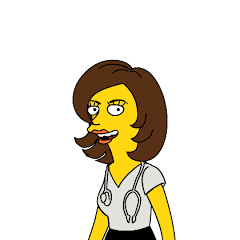I wonder if that's how God uses trials in our lives. He allows us to go through painful, devastating experiences because He knows it's the only way to cure our diseased hearts. He finds something wrong in our lives, maybe sometimes it's even a fatal diagnosis. If we keep going untreated, we could very well die. So God allows us to go through "spiritual chemotherapy". He knows it will be painful, and it hurts Him to see us go through that (just as it hurts me to see my patients suffering from toxic medications). But He knows that there is a greater good, and He encourages us to stay strong through the trials. There are days we might want to give up, when the burden seems too heavy to bear. All those side effects seem to be taking a toll. We grow restless, weary, and hopeless. When is it going to be over? We start comparing ourselves to other people, wondering why they got to be so lucky and healthy? We resent the trial that God has allowed us to go through.
But that's when you have to remind yourself of God's promises. He has declared, "For I know the plans I have for you... plans to prosper you and not to harm you, plans to give you hope and a future" (Jeremiah 29:11). He has also instructed us to "consider it pure joy... when you face trials of many kinds" and reminds us that trials help us to develop perseverance, which will strengthen our faith (James 1:2-4). Sometimes it's hard to keep holding on. Families can crumble to pieces when faced with life-changing diagnoses. But those that rely on the Lord and encourage each other can grow so much stronger and closer as a result. It doesn't make the process any less painful to endure, but it gets them through it. I know a family whose daughter was diagnosed with leukemia several years ago. She had a very difficult course with several hospitalizations and set-backs along the way. It affected the entire family, and you could see the pain and exhaustion on their faces. But they stuck with it and leaned on God, and this sweet girl is now in remission. She and her family just recently went on a wonderful Christmas vacation and enjoyed the simple things that most of us take for granted, like staying in a nice hotel and walking around the city. I saw them in clinic for follow-up and there was so much joy in their faces; joy and relief that they had made it through the storm. It really inspired me.
Whatever trial it is that we are faced with, we have to remember: 1) God is going to use it for good, 2) The pain we endure during the trial is for a purpose (it has healing power; it's "spiritual chemo"), and 3) We will come out stronger if we lean on God the whole way.

